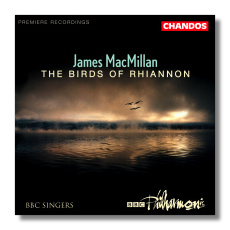
The Internet's Premier Classical Music Source
Related Links
- MacMillan Reviews
- Latest Reviews
- More Reviews
-
By Composer
-
Collections
DVD & Blu-ray
Books
Concert Reviews
Articles/Interviews
Software
Audio
Search Amazon
Recommended Links
Site News
 CD Review
CD Review
James MacMillan

The Birds of Rhiannon
- The Birds of Rhiannon
- Magnificat
- Nunc dimittis
- Exsultet
- The Gallant Weaver
- Màiri
Jonathan Scott, organ
BBC Singers/Stephen Betteridge
BBC Philharmonic Orchestra/James MacMillan
Chandos CHAN9997 DDD 70:30
Scottish composer James MacMillan seldom disappoints, and this new CD is a good example of why he is probably one of the ten best classical composers at work today. Not one of the six works on this CD is anything less than a passionate avowal of the power of music to engage, inspire, and move the listener.
The longest work here is The Birds of Rhiannon. The composer calls this 24-minute work "a dramatic concerto for orchestra with a mystical coda for choir." It is based on the Welsh legend of the Christ-like King Bran who willingly submits to execution to bring peace to warring tribes. MacMillan charges full speed ahead with a sort of Welsh Rite of Spring. The orchestra whoops, lets out war cries, and dances a demented reel. The percussionists are kept extraordinarily busy. If MacMillan has a failing, it's that his music sometimes is so loud and confrontational that conservative-minded listeners might recoil. All is forgiven, however, in the ethereal choral epilogue. The birds of the title are angelic beings who appear at Bran's death – shades of the Holy Ghost – and MacMillan (a devout Catholic) paints them movingly, with suddenly lucid orchestral writing.
Magnificat, Nunc dimittis, and Exsultet, all written between 1998 and 2000, make an interesting trilogy. The first two are choral works with orchestra, the last a symphonic fanfare, and together they take listeners on a difficult but satisfying journey of faith and wonder, from the annunciation to the promise of Man's salvation. Magnificat and Nunc dimittis, in particular, are noteworthy for the way in which MacMillan alternates the bitter with the sweet and the harsh with the easy. The closing "Amens" of both share the same music, and they almost blind the listener with their dissonant glory; it is like staring into the sun.
The two unaccompanied choral works, Màiri and The Gallant Weaver, are highly contrasted. The latter is straightforward, with a folkish simplicity. The former challenges the choir with all kinds of technical hurdles, and the work, while utterly sincere, verges on avant-gardism of a type not common since the 1960s. The text is stunningly beautiful; it begins, "She has gone like the red clouds in the east at the break of day." It was translated from Evan MacColl's Gaelic verses by MacMillan himself. Given the contrast between these two works, it is remarkable to read that both were written in 1997.
MacMillan is a fine conductor, and he keeps the heavy musical traffic running smoothly throughout this disc. The BBC Philharmonic isn't shy about respecting MacMillan's taste for extremes, and the BBC Singers easily overcome the music's difficulties, creating beauty in the process. The recording was made in Manchester's New Broadcasting House, and Chandos' engineering team matches the composer with sound that has delicacy, clarity, and power. Strongly recommended.
Copyright © 2002, Raymond Tuttle




















